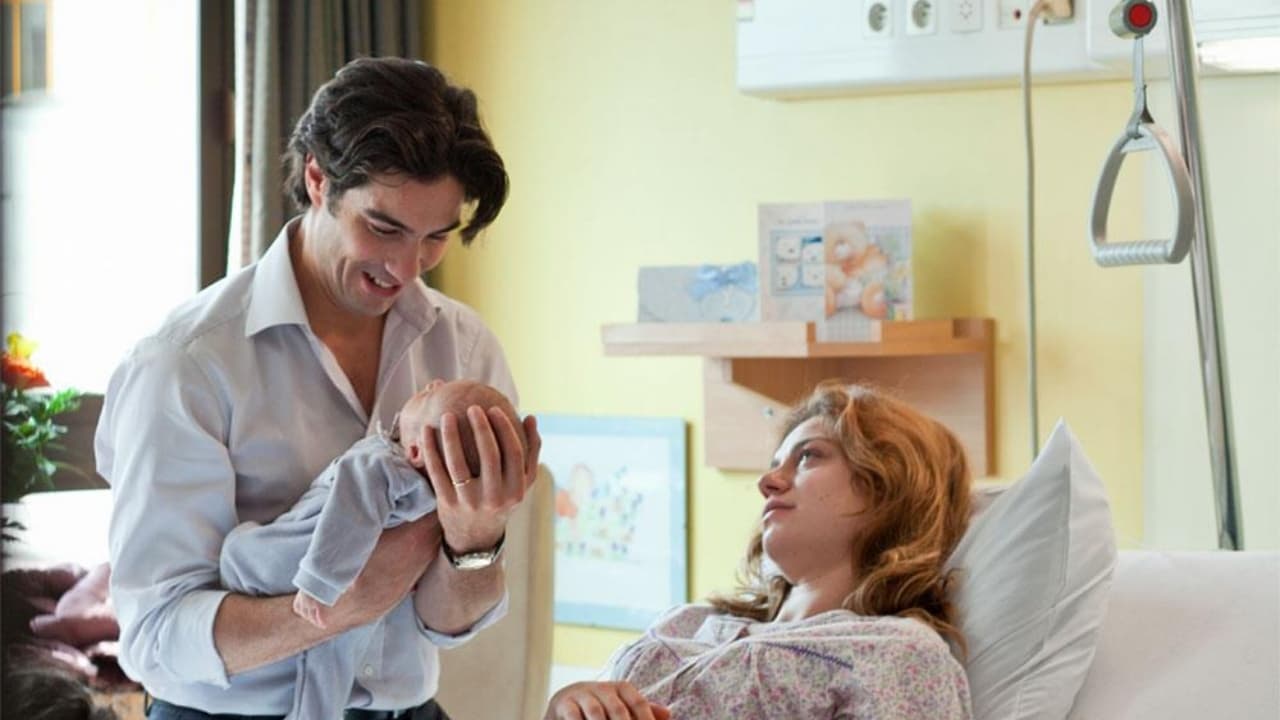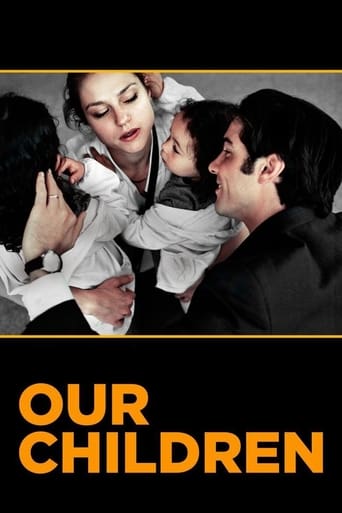

The film is directly inspired by the case of Geneviève Lhermitte, a Belgian woman who, in 2008, brutally murdered her five children.What in the world drove this hitherto model mother to such a barbarous act... is the anguished question asked by writer-director Joachim Lafosse (also Belgian) in this intense if somewhat restrained drama. A question all the harder to answer when the deplorable "heroine" of this family tragedy was at a loss, as she put it, "to understand what has happened, for I still haven't understood. I acted the opposite way to what I thought."Lafosse cannot provide THE answer, it goes without saying. How could he since the real-life murderess in person proved unable to understand herself? But he tries hard to come as close to the truth as possible. In any case, he refuses to condemn her. Instead, he describes thoroughly all the stages of the way of the cross she undergoes before committing her irreversible act.Co-written with Matthieu Raynaert and Jacques Audiard's favorite screenwriter Thomas Bidegain, "A perdre la raison" indeed follows the various developments of the affair very realistically even if the names and a few details have been changed (after all this is a fiction work, not a documentary) : Geneviève has become Murielle and her husband is named Mounir instead of Bouchaib. Plus, the couple in the fiction has four children whereas they had five in the real situation. As for their evil genius, he is not Dr. Michel Schaar any longer, but Dr. André Pinget. Basically however, all the seeds of the tragedy sown in real life are present in the fiction and in it too the wild wind cannot but be reaped: once established the toxic relationships between Murielle (who craves the intimacy of a love nest), Mounir (whose gratefulness to his foster father lets him invade it) and André (who gives the couple everything but controls their lives from A to Z), the infernal machine is activated and – a constant in classic tragedy – nothing can stop it. Such an approach will naturally be effective only if it rests on strong acting performances, which is fortunately the case here. Emilie Dequenne ("Rosetta", "La fille du RER") is deeply moving as Murielle, this Mother Courage - Mater Dolorosa turned Medea, while Tahar Rahim ("Un prophète", "Grand Central") translates to perfection Mounir's affectionate but weak temperament. As for Niels Arestrup ("Un prophète", "Diplomatie"), the formidable actor proves more menacing and terrifying than ever in the role of the couple's Nemesis hiding beneath a friendly exterior.Quite a gripping work, "A perdre la raison" is a film experience you will find hard to forget. Both a cold analysis of a tragic news event and the sympathetic portrait of a desperate woman, it is one of the most impressive movies shown in 2012.
... View MoreFew artists can do what Mister Arestrup does.A character actor in the noblest sense of the word,he never gives you the impression he overplays ;yet,he can be frightening ,makes you blood run cold ,while remaining extremely restraint.In the five last years ,his two portrayals (the wine-grower in "Tu Seras Mon Fils " ,and the stepfather in "A Perdre La Raison") are among the most impressive in the contemporary French cinema.A Young couple (she is a French Teacher,he is a Morrocan immigrant)sees their life ,slowly but inexorably ,elude them.The Young man's stepfather he calls his Godfather provides them with everything a Young couple may wish :no problem to make ends meet .But the lack of intimacy becomes hard to bear for the Young woman who would like to share a true home with her husband.But the wealthy man does not want his protégés to run away and he 's using financial blackmail as well as emotional blackmail.They are under "tutelage" :the Young man ,who seems immature sees his protector as a merciful God but his wife is not prepared to accept it.This house is not big enough for the three of us.It's putting off the inevitable;the last scene ,showing the house of "happiness" ,filmed in fixed camera shot ,could not have been more harrowing.
... View MoreBelgian Director Joachim Lafosse takes on a very uncomfortable subject. We are practically told the subject of the film from the beginning when we see 4 small coffins coming out of a plane. We then go back to happier times when the central couple first get together. Obviously this is going to lead up to the tragic finale when the 4 children are murdered, so there is always an impending sense of doom and unease when watching the film. The cinematography adds to this very well as the frames always have something out of focus in the foreground, almost a voyeuristic perspective like they are being watched all the time. Also the frame always seems cluttered and the shots always close up giving a claustrophobic feel.The couple in question (most notably the wife) undergoing this scrutiny and claustrophobia are Mounir (Tahar Rahim) and Murielle (Emilie Dequenne). Mounir is a Morroccan immigrant who legally lives in Belgium because of his adoptive father Dr Andre Pinget (Niels Arestrup). He lets Mounir live in his house and has also given him a job at his practise. As a man of considerable wealth, Dr Andre Pinget helps the couple when they get married and has them both living with him, and tags along on their honeymoon. He has also married one of Mounirs sisters, purely as an arrangement so she can live in Belgium. Basically I see Dr Pinget as a man who wants to free people from the 'oppressive' Muslim culture of Morrocco so they can live 'free' lives in Belgium. With the whole arrangement of Mounir and Murielle living under his roof with 4 children, and with Dr Pinget's influence over Mounir, this proves very stifling for Murrielle. Murielle is expected to look after the children at all times and is blamed entirely if anything goes wrong. While Dr Pinget proves useful for any medical and financial assistance, he lacks emotional sensitivity and compassion. He makes Murielle feel guilty every time she protests about the situation and feels she can't talk to her husband as he always agrees with Dr Pinget. With seemingly no way out, Murielle gradually sinks into a downward spiral towards a pit of depression. The face of happiness you often see at the start of the film descends into a face of despair and desperation. This obviously leads to the tragic event which is done with subtlety, but still shocking.This is based on a true story which took place in Belgium. I feel the Director re created these events not to gain the understanding of an audience, but to have the audience ask questions and come to their own understanding of such an horrific event. I feel one point which is raised and not often discussed in reviews I have read is about how in some ways Western culture can be just as oppressive as Muslim culture. I feel this is significant, at a time where many of the worlds problems tend to be blamed on Muslim culture, which I feel is a very misguided view. Part of the blame of Murielles downfall is because of a masculine household, lack of compassion from the male characters and inability to express true feelings. I found the only compassionate character was Mounir's mother, a devout Muslim. She is the only person who shows sympathy towards Murielle, especially in a tender scene where they embrace at the airport. The desperation in Murielle's face and her inability to let go shows her desperation for feminine connectivity.The more you think about it, more questions arise. Did Murielle really have a hard time? She has everything she needs. Does she have a history of mental illness? The film does not hint at this and is left open. Is Dr Pinget a bad person or is he doing what he feels is right? Should we feel sympathy for Murielle? These are only some of the questions I had. I felt there where too many questions and some story threads were left unfinished. One of the biggest flaws of the movie was the fact that Mounir was not featured in the final 30 minutes of the movie. I felt his character needed some closure and at least a scene with Dr Pinget. As far as performances are concerned, it was expertly acted. I feel Emilie Dequenne is one of the best performances I have seen this year so far this.A memorable film for obvious reasons, but not a film I would want to experience again! Check out my film review blog - www.projectionistreview.wordpress.com
... View MoreBelgian screenwriter and director Joachim Lafosse's fifth feature film which he co-wrote with French screenwriter Thomas Bidegain and Belgian screenwriter Matthieu Reynaert, is based on a real-life incident that took place in Brussels in 2007 where a 42-year-old woman killed her five children. It premiered in the Un Certain Regard section at the 65th Cannes International Film Festival in 2012, was shot on location in Morocco and Belgium and is a France-Belgium-Luxembourg-Switzerland co-production which was produced by producers Jacques-Henri Bronckart and Olivier Bronckart. It tells the story about Mounir and Murielle, a couple in their late twenties who lives in Brussels, Belgium. Murielle is a Belgian elementary school teacher and Mounir, a Moroccan and former youth worker without a permanent residence certificate. After deciding to get married, Mounir shares the great news with his close friend André Pinget, a wealthy doctor who has been like a father to him through most of his childhood and helped him and his family in many ways. André gives Mounir a full-time job at his practice, let's him and Murielle live with him in his apartment and Murielle and Mounir is happily married, but as time goes by André's ways of making himself indispensable and his insisting involvement in their lives begins to stagnate their relationship.Precisely and commandingly directed by Belgian filmmaker Joachim Lafosse, this somewhat biographical and fictional story which is narrated mostly from the female protagonist's viewpoint, draws an intimate and nuanced portrayal of a Belgian teacher's saint like suffering after marrying, becoming a mother and being second-rated by a husband who is more committed to honoring the wishes of his generous and demanding father figure. While notable for it's naturalistic milieu depictions, fine production design by production designer Anna Falguères, cinematography by Belgian cinematographer Jean-François Hensgens and realism, this narrative-driven and dialog-driven psychological drama triangle depicts an in a sense provocatively heartrending, due to it's non-judgmental and empathic portrait of the main character, study of character and contains an efficient classical score which emphasizes the film's tragic undertones.This finely paced character piece about emigration, conflicting human relations, motherhood, mental exhaustion and paper marriage which is set in Brussels, Belgium during a summer in the early 21st century and which has been chosen as Belgium's submission to the Academy Award for Best Foreign Language Film at the 85th Academy Awards in 2013, is impelled and reinforced by it's cogent narrative structure, abrupt editing by film editor Sophie Vercruysse, substantial character development, the poignant and impressive acting performances by Belgian actress Émilie Dequenne who comes close to her unforgettable acting performance in the Dardenne brothers' "Rosetta" (1999) and the fine acting performances by French actors Niels Arestrup, Tahar Rahim and Belgian actress Stéphane Bissot. A concentrated and ambivalent love-story which gained, among other awards, the Un Certain Regard Award for Best Actress Émilie Dequenne at the 65th Cannes Film Festival in 2012.
... View More